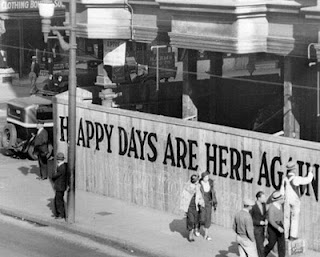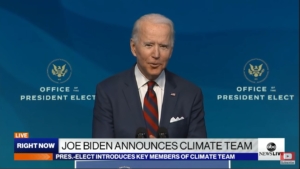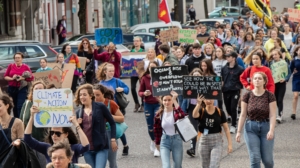New Deal Here Again, Chicago Shenanigans, and House Hunters: Oregon
Here’s What You Need To Know
As Democrats had no clear path to combat climate change only a few weeks ago, the Green New Deal has seemingly come out of nowhere, gaining national attention as influential House members, Senators, and potential 2020 presidential candidates voice their support for more urgent action. With some calling it this generation’s “moon shot” or “civil-rights movement,” the Green New Deal has gained enough momentum to suggest that it will become a major issue impacting companies, cause organizations, and consumers next year and beyond. Here is what you need to know about the Green New Deal and its potential impact:
- What Is The Green New Deal? Inspired by President Franklin Roosevelt’s New Deal programs during the Great Depression, the Green New Deal is a pledge to combat climate change supported by incoming Rep. Alexandria Ocasio-Cortez and young climate activist groups such as the Sunrise Movement and Justice Democrats. However, there is confusion as to what exactly this pledge entails. Currently, the Green New Deal is merely a slogan for an aggressive approach to climate change, a call for a(n impossibly) quick transition to 100% renewable energy (natural gas and nuclear need not apply), and an idea of how a new select committee on climate change should function. More ambitious interpretations believe it to be an expansive plan to achieve net-zero carbon emissions by 2050 with a goal of achieving full employment, advancing racial justice, and providing universal healthcare.
- Who Is Behind The Green New Deal? Besides the vocal support of the incoming-congresswoman from New York, a relatively new group – the Sunrise Movement – has taken the lead in organizing young people to push for ambitious action to fight climate change, including the Green New Deal, and exposing what they believe is wrong with fossil fuel companies. Sunrise grew out of the 2016 election, and is focused on winning elections from 2018 through 2020, merging political organizing with the “creativity, moral clarity, and disruptiveness of efforts like divestment and NoDAPL.” The group’s ambitious efforts include grassroots mobilization in “politically significant states” and the goal of creating small “hubs” throughout the country to influence elections in 2020 and beyond. With connections to Occupy Wall Street and the divestment movement, including groups that received grants from booster organizations such as 350.org and Open Society Foundations, Sunrise is certain to be an influential group targeting policymakers and the energy industry in the public arena going forward.
- What Challenges Does A Green New Deal Face In Becoming Reality? The political challenges, from Republican opposition to a lack of clarity to an internal power struggle between veteran lawmakers and vocal activists, are daunting. Yet, perhaps the two most challenging obstacles are technology and popular support. For the former, current and near-term technology is not capable of generating anywhere near enough reliable, always-on electricity or store enough of it from renewables to power America. As to the latter, public support for the Green New Deal is high now, but many Americans are just hearing about it for the first time, few know what it means, and once they learn about how it will impact their cost and quality of living, support could dissipate quickly.
- Is The Green New Deal Here To Stay? The groundswell of initial support for the Green New Deal, as well as the growth and influence of new organizations like the Sunrise Movement, represent a heightened level of political and reputational risk for companies, cause organizations, and consumers. As this New Age of Activism becomes fully formed, environmental groups are using new and more aggressive tactics that have never been seen before, and they are organizing more quickly and widely than ever. Thus far, there has been little organizing on the opposite side of this public policy issue in response, although this new normal suggests that the risks will increase, rather than decrease, in the near- to long-term.
As the Green New Deal gains traction, companies and cause organizations can take some solace in the fact that there are no concrete policies and proposals yet, meaning there is still time to proactively prepare their strategy to confront this coming public affairs challenge. Before voicing support in an attempt to ward off public peer pressure, companies and organizations should be careful to appease such a broad and unspecific coalition, some parts of which are unlikely to be swayed, appeased, or satiated unless they get their way.
News You Can Use
House Hunters: Oregon
Subscribe to Receive Insights
"*" indicates required fields
If you live in Oregon, your house may soon get more crowded. In order to increase housing supply, lower prices, and diversify neighborhoods, the Oregon state legislature introduced a new proposal that would ban single-family zoning in towns and cities, which one economist argues would more efficiently accommodate future population growth than simply building more housing under current zoning laws. However, critics claim the ban will encroach on residents who own and want a single-family home and care about property rights, but could also incentivize homeowners to sell their land to developers, increasing demolitions and ruining neighborhoods.
The proposal is the first of its kind at the state level, but it comes on the heels of a similar law passed by the Minneapolis City Council earlier this month and the City of Portland is currently considering its own ban, perhaps signaling a broader trend toward top-down zoning reform as a policy proposal du jour – despite evidence that government zoning rules have contributed to rising housing costs across the country rather than make housing more accessible.
California Texting Tax Will BRB
California taxpayers may want to thank federal regulators for shielding them from higher taxes following the Federal Communications Commission’s vote to classify texting as an “information service” rather than a “telecommunications service.” The FCC’s decision forced the California Public Utilities Commission to back down from a proposed tax on text messages, which had been scheduled for a January vote to determine whether texting should fall under a California law levying a surcharge on telecom services.
“Prior to this FCC ruling,” the CPUC explained on Twitter, “text messaging was not a classified service under federal law,” so the CPUC saw it as a potential avenue to raise revenue from taxpayers. This episode serves as a reminder of the impact that federal and state regulators can have on individuals and businesses, and how even far from the halls of Congress, the seemingly smallest details can have some of the biggest impacts.
Bad Batteries Busted
Residential batteries used to store energy and power homes, long lauded as a critical technological innovation in the fight against climate change, may not be as green as once thought, according to a new study. Climate activists have promoted home batteries as a way “to take control of energy costs, get more from solar panels, and be less reliant on importing dirty power from the regional electricity grid.” Yet, researchers determined home battery users tend to draw power from the grid for storage when energy is at its cheapest – that is, when it’s being produced by coal and other fossil fuels.
In order to reverse this incentive structure, the study found, utilities would need to drastically hike prices on electricity at times when power is mostly being produced by fossil fuels. In fact, the main result of this revelation looks to be more pain for consumers: California regulators will begin mandating “time-of-use” rates in 2019 to artificially inflate energy costs, and several other states are reportedly not far behind.
Chicago Shenanigans
Chicago’s good old-fashioned machine politics give a whole new meaning to vulnerability. David Krupa, a 19-year-old Republican student at Chicago’s DePaul University, knew his chances were slim when he decided to run for Alderman of the city’s deep blue 13th Ward, but he collected more than triple the number of requisite signatures – 1,729 – and filed as a candidate. Illinois House Speaker Michael J. Madigan (D) and his 13th Ward Democratic Organization had other ideas: the Boss found over 2,700 people to swear affidavits revoking their signatures from Krupa’s petition.
Not only did more than a thousand more people revoke their signatures than had actually signed, but subsequent examination of the names revealed only 187 of the revocations matched names on the petitions. Election attorney Michael Dorf opined “So, what about the 2,609 people who didn’t sign for David but who filed revocations? That’s fraud. That’s perjury. That’s felony.” That’s also a gaping vulnerability for which we should hope voters demand accountability. In the meantime, welcome to Chicagoland, Mr. Krupa!



